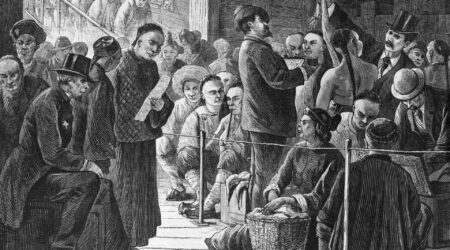Social Science Matrix is proud to welcome eight new Matrix Research Teams — three faculty-led teams and five graduate student-led teams — for the 2025-2026 academic year. Matrix Research Teams are groups of scholars who gather regularly to explore or develop a novel question or emerging field in the social sciences. The teams convene participants from multiple disciplines and focus on research questions with real-world significance; they are designed to encourage collaboration, provide professional development, and create opportunities for faculty engagement and mentorship.
This year’s funded teams will address a wide spectrum of social science topics. The faculty-led projects will focus on such issues as applying the concept of the “commons” to the social challenges of climate change; developing a database of letters sent in 19th-century Libya; and investigating the use of filmmaking as a methodological and epistemological tool in the social sciences.
The student-led teams will address such topics as how expert networks have shaped industrial policy and infrastructure development in East and Southeast Asia; how global capitalism can be made comprehensible through critical study; using personal narratives to understand and improve the experience of Latinx students at UC Berkeley; developing a research framework for understanding farmworker vulnerabilities; and understanding the recent rise of cyberlibertarianism, venture capital extremism, and techno-authoritarianism.
“Matrix Research Teams are central to the mission of Social Science Matrix to promote cross-disciplinary conversations and innovative social science research,” says Cori Hayden, Professor of Anthropology and Interim Faculty Director of Social Science Matrix. “We look forward to welcoming this year’s teams and helping them explore important social science questions from new, diverse perspectives.”
“It’s incredibly rewarding to create a space where these scholars can push their disciplinary boundaries and address critical, real-world challenges,” adds Sarah Harrington, Program Manager for Social Science Matrix.
Matrix Research Teams are chosen following review by a cross-disciplinary panel of faculty members. Faculty-led teams receive $5000 in funding and hold regular meetings focused on a defined research problem, with a goal to apply for one or more grants for continued research. The student-led teams will receive up to $1500 to explore a new area or question of inquiry, in part to assess whether it has potential for further investigation. In addition to funding, all Matrix Research Teams receive support in coordinating, scheduling, and reserving space for meetings and events. Matrix also provides communications support to help publicize each group’s work, as well as assistance with identifying and applying for further funding.
Below are summaries describing the 2025-2026 Matrix Research Teams, with abstracts provided by the teams in their proposals.
Faculty-Led Research Teams
Commons and Property in the Climate Crisis Research Team
Team leads: Matthew Shutzer, Assistant Professor, Department of History; Chandana Anusha, C.W. Fellow, Department of Geography; Oliver Cussen, C.W. Fellow, Department of Geography
The planetary crisis has revived an interest in the past and future of “the commons,” where social relations and natural resources are governed outside the logic of the market and without the regulation of the state. Whereas the commons have typically been associated with delimited spaces and organizations, such as the agrarian village or local guilds, contemporary research explores the possibility of thinking about the commons on the scale of oceans, the species, or the planet. This Matrix Research Team will bring cutting edge research into dialogue with established debates on the commons to interrogate a central research question: To what extent do historical, existing, and imagined examples of the commons—from the precapitalist village, the urban commune, or the global commons—offer models for sustainable and democratic forms of social ecology in an era of accelerated land grabs, resource extraction, and anthropogenic climate change? The team will bring together researchers from Geography, History, Anthropology, Legal and Political Theory, and English Literature, each currently working on projects that explore the relationship between property, nature, and accumulation across different sites and periods. Our scales of analysis will move from the agrarian to the oceanic, subterranean to the atmospheric, built environments to the non-human world, and regional to the planetary. By sketching out the regimes, fantasies, and memories that drive the making and unmaking of commons, we hope that our conversations will contribute to policy-making on one of the biggest natural resource questions of our time.
Letters of the Sahara: Towards a digital toolkit for mapping language change, social networks, and units of exchange in the nineteenth-century Arabic correspondence to/from Ghadames (Libya)
Team leads: Bruce Hall, Associate Professor, Department of History; Adam Benkato, Associate Professor, Middle Eastern Languages and Cultures (MELC)
As imported European paper became cheaper and more easily obtainable in the Sahara Desert and its hinterlands in the eighteenth and nineteenth centuries the practice of letter-writing grew enormously. As in other parts of the world, letter-writing made it possible for distance to be bridged in new ways, drawing far-flung people into circuits of information exchange. Our project seeks to explore how letter-writing in this period contributed to broader economic historical changes in commercial practices associated with trans-Saharan trade, availability of credit, recoverability of debt and inheritances. Writing in Arabic also accelerated processes of Arabization of Berber- and sub-Saharan language-speaking communities in the region and as such, letters are a key index of new forms of literacy among non-elite people and broader language change.
There are thousands of extant Arabic letters across the circum-Saharan region, almost all of them produced since the second half of the eighteenth century. Some are held in public archives but many more remain in private family collections. Very few have been published. Our project aims to develop digital and database tools to create better datasets from the contents of the letters so that they can be used in social scientific research. We will focus on one set of letters sent to/from the ancient northern Saharan town of Ghadames, in modern-day Libya. A significant oasis town since Roman times, communities of merchants from Ghadames wrote letters to/from important trading towns such as Tripoli, Tunis, Kano, and Timbuktu, from when letters can be found today.
Filmmaking as a Social Science Method: Research Team
Team leads: Natalia Brizuela, Professor, Departments of Film & Media and Spanish & Portuguese, UC Berkeley; Naomi Etsehiywot, PhD Student, Department of African-American and African Diaspora Studies
This interdisciplinary research group investigates the use of filmmaking as a methodological and epistemological tool in the social sciences, proposing an expanded approach to the study of social phenomena. Firmly situated in the historical development of global capitalism and Western hegemony, film production has long been a medium for both reflecting and disrupting power and ideology, offering insights into economies of representation. By critically engaging with the aesthetic dimensions of filmmaking—such as composition, lighting, editing, and sound—our research group asks how visual representation constructs, destabilizes, and amplifies the ideological and relational dynamics embedded in traditional social science methods like ethnography and participant observation. Drawing from feminist, Black, and postcolonial studies, and their critical insights into the power dynamics of representation, our group explores how film can interrogate the affective and sensory dimensions of our questions around migration, humanitarianism, urban transformation, and racialized subjectivities. Through this lens, we position filmmaking as a methodology for interrogating the distribution of human value across populations, and a unique medium for relating to our objects of study and traditional social science techniques. Our research not only contributes to evolving qualitative methodologies in the social sciences, but also advances the potential of visual media to (re)shape academic discourse and foster deeper understanding of global social issues.
Graduate Student-led Research Teams
Asian Infrastructures and Expert Networks Research Team
Team lead: Aaditee Kudrimoti, PhD student, Department of City & Regional Planning
The Asian Infrastructures and Expert Networks team will investigate how expert networks have historically contributed to the successful implementation of industrial policy and large-scale infrastructure development in East and Southeast Asia. While much of the existing literature attributes these developmental successes to state-capitalism and highly-centralized governance, we argue that such explanations risk overlooking the institutional and technocratic arrangements that enabled policy implementation on the ground. Through a focus on the Chinese electricity sector, we examine how engineers, economists, planners, and policymakers collectively translated national sectoral goals into coordinated infrastructural outcomes. Drawing from disciplines including history, economics, planning, and political ecology, we examine how configurations of state, expertise, and labor enabled the expansion of critical infrastructure and supported the rise of East and Southeast Asian countries in the global economy.
We will conduct a case study on China’s electricity system, from the Reform and Opening period to present-day efforts in decarbonization and electricity market liberalization. We will hold monthly expert roundtables with practitioners from institutions like LBNL, ERG, and Berkeley’s California-China Climate Institute. These interviews will be recorded, coded using MAXQDA, and analyzed collaboratively by our student team. Our goal is to develop alternative theoretical frameworks that move beyond state-capitalist and regime-type explanations and better capture the role of expert networks in sectoral planning. This project offers timely insights for liberal democracies currently embracing industrial policy, by drawing lessons from Asia’s developmental states on how to cultivate and deploy expertise to meet strategic infrastructure goals.
Embodied: Critical Logistics and Empire Research Team
Team lead: Ajung Ryoo, PhD student, Department of Anthropology
The question at the heart of our research team is: How can global capitalism—a system propped up by logistics and technology—be made comprehensible? On the one hand, these systems are ideologically presented as historically inevitable and necessary. On the other, capitalism appears unintelligible, ambiguous, nonsensical, labyrinthine; it presents itself in different languages, shapes and mediums, and it seems impossible to grasp or battle such a shapeshifting force. Therefore, instead of attempting the impossible project of mapping out capitalism into a holistic picture, we attempt to locate or assemble the shifting openings, cracks, chokepoints, spillages, or leaks, which undo and warp the demarcated boundaries between bodies, nations, and capital which are continuously enforced by colonial, ideological, and corporate empires. In short, we will attend to palpable, embodied experiences in specifically situated conditions to make intelligible the ever-evolving, multi-headed figure of global capitalism and logistical networks that shape our lives with overwhelming force.
La Colectiva
Team leads: Michelle Zaragoza, PhD student, School of Social Welfare; Jimena Perez, PhD student, Department of Geography
La Colectiva grapples with navigating the sociopolitical and cultural dimensions of the academic terrain as Latinx graduate students and theorizing and making sense of our multiple positions as scholars, researchers, practitioners, educators, healers, and members of our communities. While the representation of Latinx students at Berkeley has increased over the past couple of years, as of 2024, Berkeley does not yet meet the criteria for an HSI designation, and many Latinx students are disproportionately affected by campus climate, food insecurity, and mental health (UC Berkeley UCUES, 2020). However, what remains absent is an interdisciplinary space within Berkeley that supports Latinx students with their creative and community-engaged methodological training and scholarship, and that makes space for grappling with the psycho-emotional toll of academia that graduate students face. La Colectiva turns to testimonios (personal narratives) to elucidate individual and collective narratives of challenge, resistance, empowerment, and transformation. This embodied theory of transformation is the foundation of our group. La Colectiva focuses on the central question: What methodological frameworks enable us to coexist, embracing our intersecting identities instead of separating our emotions from our research?
Farmworker Justice Research Team
Team lead: Alina Leticia Zárate, PhD student, Energy and Resources Group
Farmworkers make up one of the most vulnerable labor forces in the United States despite their essential role within the agricultural industry. Due to the various social, political, and environmental challenges they face, farmworkers have traditionally been studied in various disciplines focused on segmented aspects of their experience. While informative, little work has been conducted to synthesize these various disciplinary findings. As a result, our research addresses the following questions: (1) What are the major disciplines and topics that make up farmworker research? (2) What are the major contributions of this research, and what methods do they employ? (3) How can these contributions be combined to create a farmworker justice framework that provides a more comprehensive and holistic understanding of farmworker vulnerabilities, thus informing future research efforts and policy developments? Through an extensive interdisciplinary review we seek to develop a farmworker justice framework that can inform future research and policy interventions concerning agricultural laborers.
Contours of Techno-Authoritarianism
Team leads: Jillian (Lee) Crandall, PhD Student, Department of Geography, Designated Emphasis in New Media & STS
This research group aims to study the critical intersection between technology, politics, power, and space in the 21st century. Specifically, we aim to better understand the rise of cyberlibertarianism, venture capital extremism, secessionism, and techno-fascism/techno-authoritarianism. With roots in Silicon Valley’s “build fast and break things” logic of technological innovation, democracy is now seen by some tech-venture capitalists as an outdated technology to be replaced with algorithmic decision-making and private technological governance solutions. These accelerationist logics are posed to concentrate power for VC tech elites and threaten the freedoms, lands, and lives of marginalized populations on the grounds of race, gender, and sexuality. With this, the Contours of Techno-Authoritarianism Research Group will center on the following: how media and flows of information are controlled; how anti/post-state development intersects with far-right extremist ideologies; how they have moved from fringe to mainstream; and how these ideologies are being made concrete with technical infrastructures such as AI, blockchain, and cryptocurrency. This research will make connections between histories of technology and fascism, drawing from critical theory and the Frankfurt School, social theory on crowds, and contemporary scholarship on tech-libertarianism and politics of exit/secession. We hope to intersect the critical social sciences with political economy, political science, history, literature, computer science, new media, language, and rhetoric. As this research group is future-thinking and praxis-oriented, we will also explore strategies of resistance movements and democratic interventions which may help inform and connect across scholar-activist lines.



